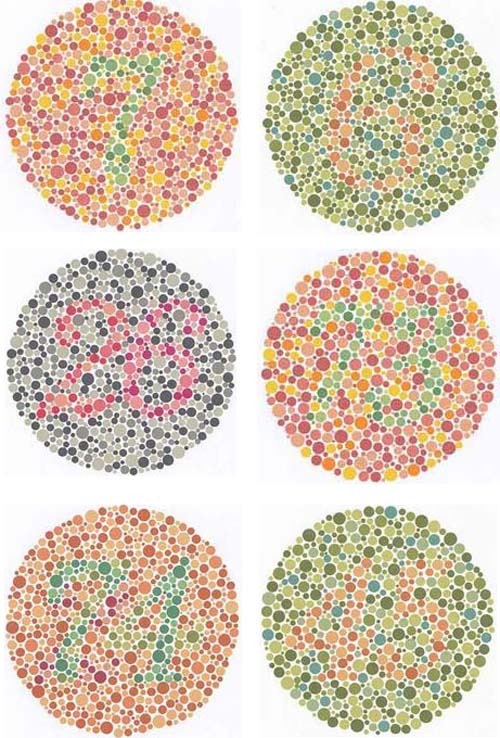
Some typical tests for color blindness. If you have trouble seeing the numbers in these circles, you may be color blind. I'm not color blind, but the ones at the bottom are a little trickier than others, I must admit.
(Images by Vurdlak from Mighty Optical Illusions)
- What I was told was technically incorrect. Women can be color blind, but it is highly unlikely.
- Women's eggs, which contain two X chromosomes, 90% of the time carry the gene for color vision. Only 10% of the time will they carry the recessive gene for color blindness.
- About 45% of the time, the X chromosome in the male's sperm carries the dominant gene for color vision. That is, the male's sperm has a greater chance than the female's eggs of carrying the recessive gene for color blindness.
- Based on those various percentages, it works out so that 5% of the US population are color blind males, while only 0.5% of the US population are color blind females.
- While it is very rare for women to be color blind, it is possible. More often, if females are born with the recessive gene, they only carry it, but the color blindness is not expressed.
- There are many different kinds and degrees of color blindness, but they can essentially be grouped into three categories:
- Red/Green, which is the inability to distinguish reds and greens
- Blue/Yellow, which is much more rare
- Truly color blind, and able to see only grays, but this is extremely rare.
- The most common color-deficiency is the difficulty or inability to see green.
- Physically, if a person is color blind, the cones or color-sensitive receptors in their retinas are somehow not working. The cones contain pigments which select for red, green, and blue light. In people who are color blind, the amount of pigment per cone may be reduced, or one or more of the cone types will simply be absent.
- Some problems that color blind people face include:
- Determining if meat is cooked all the way through, or if it is still red
- Interpreting color-coded weather maps
- Being able to see whether someone is getting sunburned
- Knowing whether a flashing traffic caution light is red or yellow, and how to proceed
- No interest at all in eating spinach or other dark-green vegetables, which appear to the color-blind eye as black or dark "like cow pat."
- If you want to see what any given web page would look like to a person who is color blind, go here to try it out.
This just in, as of September 2009: scientists have recently found a way to correct color blindness in monkeys. The researchers used a non-harmful virus to carry a gene that replaces the missing gene responsible for causing color blindness. The virus replicates and inserts the gene into the cells, and in about five months, the monkeys could see color. The researchers are hopeful that this treatment or one very like it could be used to correct color blindness or perhaps other visual defects in humans.
Sources
Wayne's Word, Color Blindness & Baldness in People
Toledo-Bend.com, About Color Blindness
Hidden Talents, Color Blindness
Katherine Harmon, "Loci Color: Gene Therapy Cures Color-Blindness in Adult Monkeys," Scientific American, September 16, 2009
Hi, I Googled "chick peas+color blindness" and found your great article. I used to have a color vision problem and am a female. Here's my blog post on my quite unusual experience:
ReplyDeletehttp://thebunnybungalow.com/2008/06/color-blind-cure.html
I think my "color blindness" is/was metabolic and a tag for the rare genetic disorder I have called porphyria...the way color blindness is a tag for those that have a dangerous, genetic allergy to chick peas.
Anyway, I enjoyed reading your post.